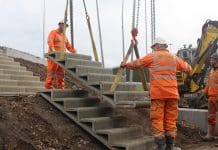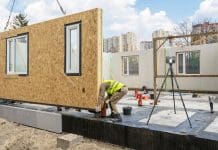The housing committee has urged the government to embrace Modern Methods of Construction (MMC) in order to meet the target to build 300,000 new homes a year by mid-2020s
In a report, the committee urges the government to unlock the potential for Modern Methods of Construction (MMC) to build homes quicker, more cheaply, while maintaining build quality.
However, they will need to act quickly to increase capacity and improve investor confidence if it is to have a meaningful impact on UK housebuilding targets.
Modern Methods of Construction comprise a range of innovations including the use of new materials, digital working and precision manufacturing techniques in the housebuilding process. MMC processes can be used alongside traditional building methods and allow for greater use of offsite construction.
At present, the use of MMC in housebuilding is low and the government will need to act quickly if it is to make an impact in meeting housebuilding targets. Supply chain capacity will need to be increased, and greater focus placed on ensuring the workforce has the required skillset for developing technologies.
The government should work with Homes England and training centres, such as the Advanced Manufacturing Research Centre, to develop targeted programmes targeted for use in the manufacture of MMC homes, says the committee.
Initial work to develop centres of excellence, bringing together businesses and academia to support innovation, is welcome but could be strengthened by coordinating with the Transforming Construction Programme and Construction Innovation Hub. These networks could form an ideal arena for testing and standardisation of MMC processes and components, as well as ensuring they comply with building regulations.
The government will also need to improve data collection and sharing if it is to overcome reluctance to utilise MMC among lenders, insurers and home buyers. To gain the confidence of the industry as a whole, as well as consumers, the committee has said they must establish a database of MMC homes to demonstrate the long-term value and durability of MMC.
The committee backs the creation of an “MMC Scheme”, setting out a single set of standards for warranty providers, to provide greater certainty.
Expansion of MMC faces many additional challenges including difficulties accessing land to build on, opaque and confusing building regulations and high upfront costs. The government should investigate the specific impact of the current regulatory systems and access to funding on MMC, and consider options for measures designed to overcome existing barriers.
Chair of the housing, communities and local government committee, Clive Betts, said: “If the government is to have any chance of meeting its target of 300,000 new homes a year it cannot simply rely on traditional methods of construction. They must make a serious effort to support the use of new and emerging technologies that have the potential to have a transformative impact on the speed, cost and quality of home building. This is not simply about shifting production away from the building site and into factories. It is about seizing opportunities that modern technologies allow, whether it be precision manufacturing, use of new materials or digital working.
“First and foremost they must create the conditions to improve investor and consumer confidence. Reluctance is understandable. The perception is that the building innovations of the sixties created homes that failed to survive half a century, while rows of Victorian terraces are still standing. Proving quality and longevity will be key. That is why we have called on the government to collect and publish the data that prove new building methods work, and also show if they have failed.
“The government will also need to support the industry to grow the capacity needed for MMC to play a greater role in national housebuilding. They will need to ensure that the right training schemes and apprenticeships are in place so that we have the skilled workforce that can utilise MMC techniques. They must also work with the industry to support the development of robust supply chains and support innovative businesses develop.
“The housing system is in urgent need of a major boost and if the government is to have any chance of meeting its ambitious target it must grasp every opportunity new technologies allow. But they must act fast and act now.”

















